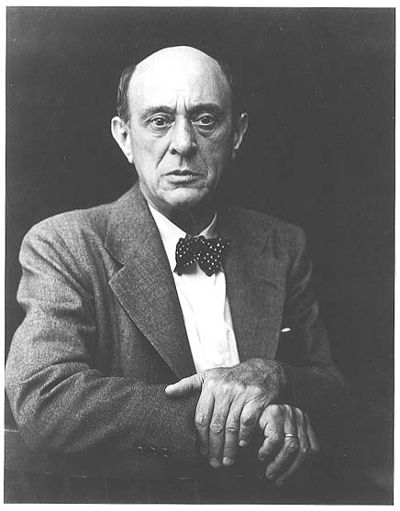Arnold Schoenberg (Arnold Franz Walter Schoenberg)

Arnold Franz Walter Schoenberg or Schönberg (; 13 September 1874 – 13 July 1951) was an Austrian composer, music theorist, and painter. He was associated with the expressionist movement in German poetry and art, and leader of the Second Viennese School. With the rise of the Nazi Party, Schoenberg’s works were labelled degenerate music, because they were modernist, atonal and what even Paul Hindemith called “sonic orgies” and “decadent intellectual efforts”. He emigrated to the United States of America in 1934. Arnold Schoenberg’s approach, both in terms of harmony and development, has been one of the most influential of 20th-century musical thought. Many European and American composers from at least three generations have consciously extended his thinking, whereas others have passionately reacted against it. Arnold Schoenberg was known early in his career for simultaneously extending the traditionally opposed German Romantic styles of Brahms and Wagner. Later, his name would come to personify innovations in atonality (although Schoenberg himself detested that term) that would become the most polemical feature of 20th-century art music. In the 1920s, Schoenberg developed the twelve-tone technique, an influential compositional method of manipulating an ordered series of all twelve notes in the chromatic scale. He also coined the term developing variation and was the first modern composer to embrace ways of developing motifs without resorting to the dominance of a centralized melodic idea.
Arnold Schoenberg was also an influential teacher of composition; his students included Alban Berg, Anton Webern, Hanns Eisler, Egon Wellesz, Nikos Skalkottas, and later John Cage, Lou Harrison, Earl Kim, Roberto Gerhard, Leon Kirchner, Dika Newlin, and other prominent musicians. Many of Schoenberg’s practices, including the formalization of compositional method and his habit of openly inviting audiences to think analytically, are echoed in avant-gardemusical thought throughout the 20th century. His often polemical views of music history and aesthetics were crucial to many significant 20th-century musicologists and critics, including Theodor W. Adorno, Charles Rosen, and Carl Dahlhaus, as well as the pianists Artur Schnabel, Rudolf Serkin, Eduard Steuermann, and Glenn Gould. Schoenberg’s archival legacy is collected at the Arnold Schönberg Center in Vienna.
Born
- September, 13, 1874
- Leopoldstadt, Vienna, Austria
Died
- July, 13, 1951
- USA
- Los Angeles, California
Cemetery
- Vienna Central Cemetery
- Vienna, Austria

